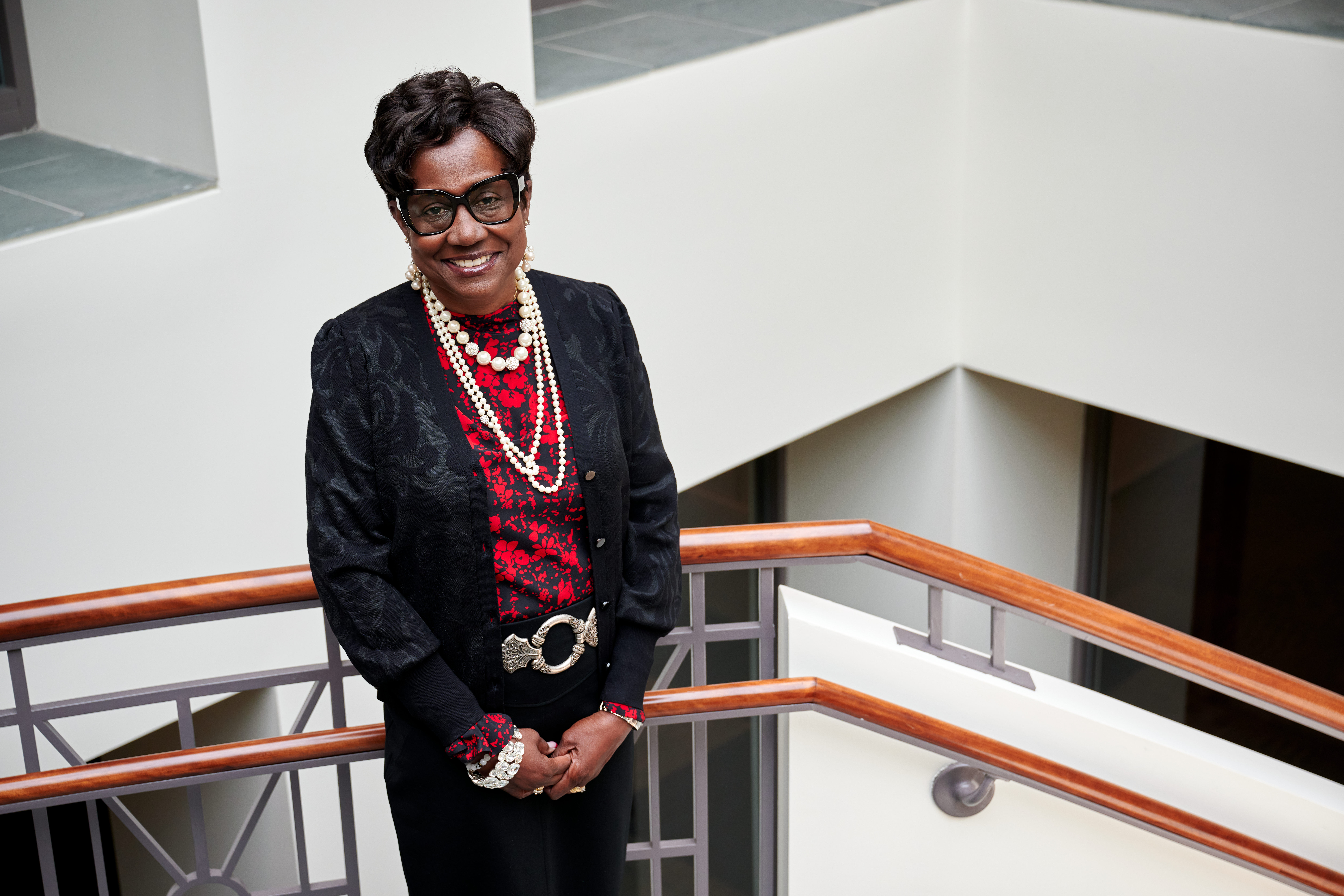Theresa Hopkins-Staten: Energizer
An Eversource exec who is helping to spark the futures of a new generation of UConn students

Hopkins-Staten works with the African American Alumni Council to support students of color as they move through UConn and prepare to enter the workforce.
When addressing an audience of young women pursuing business careers a few years ago, Theresa Hopkins-Staten '81 (CLAS), '84 JD advised that "opportunity doesn't always come in pretty packages."
"Opportunities present themselves in different forms at different times and seasons in your life, and most of them require you to dig deep within yourself," she says. "For me, it's always meant that if God brings me to it, he certainly will give me what's necessary to get through it and faithfully do so."
Asked a few years ago to take on a newly created role at Eversource Energy, Hopkins-Staten embraced the opportunity and was named vice president for corporate citizenship and equity.
"The position was created because of the aftermath of the murder of George Floyd in 2020. Eversource, like many corporations, began to talk about and to think about systemic bias and racism and what it meant for the company, what it meant to its employees," says Hopkins-Staten, who began her 30-plus-year career there as senior counsel and assistant corporate secretary. After several years, she was named president of the Eversource Energy Foundation and director of corporate community relations, where her team developed programs to assist customers with limited incomes and invested millions of dollars in Connecticut, western Massachusetts, and New Hampshire on initiatives aligned with the foundation's focus areas, including community wellness and basic human needs; education, clean energy, and environmental stewardship; diversity, equity, and inclusion; and community, economic, and workforce development.
A large corporation taking on issues of equity and inclusion concerning historically marginalized customers and communities at an officer-level position was something Hopkins-Staten says she had never encountered before. "It was something that really made me think, because although this is certainly passionate work of mine, it's different when you are asked to take on this awesome responsibility and lead an entire company basically around this critical issue," says Hopkins-Staten. "But I did, and I did it by working with some great folks."
She's talking about the multigenerational, diverse group of Eversource employees called the Pro Equity Advisory Team, tasked with determining what equity and equality "looked like or should look like" for the company. That started with building trust around the idea of equity and inclusion. "It's a topic that needs to be talked about, but people are really reluctant, hesitant, and reserved to talk about it for so many different reasons. But to do this work — and to do it with fidelity — I had to make certain that the members of the team felt comfortable, that they felt they could trust me and be very, very transparent."
We had to bring our "true, authentic selves. It meant bringing in all of our individual biases, because we all know that we have them. It was a time of growth for me personally and professionally, and we experienced some great milestones and testimonies that we still continue to share." They started each meeting with a "Did You Know" moment, spotlighting a member and their lived experience as it relates to equity to foster trust, learning, and engagement.
Hopkins-Staten has shared her legal experience, organizational skills, and passion for promoting equity and environmental justice with a broad range of organizations in Connecticut, including the iQuilt Partnership, Connecticut"“Rhode Island National Multiple Sclerosis Society, Saint Francis Foundation, United Way of Connecticut, Urban League of Greater Hartford, and National Urban League. "I believe in leading by example," she says, adding, "I like to serve on boards that do work and have missions that are aligned with my value system."
In recent years, her volunteerism has extended to her alma mater as a co-chair of the University of Connecticut African American Alumni Council — despite an undergraduate experience she says was difficult to negotiate.
"When I walked onto UConn's campus in 1978, it was a different time, it was a different place." Students of color, she says, faced criticism and hostility not only from other students but also in the classroom. In spite of that, she says, students of color "rose above those challenges."
Reengaging with the University required some "soul searching," she says."I made a decision to move beyond what had been a painful experience toward making the change I knew was desperately needed. And that meant that I had to become involved as an alum."
Hopkins-Staten says she is "very proud" of the progress the African American Alumni Council has made in recent years, including raising funds for an endowed scholarship awarded to students who have demonstrated academic excellence and a commitment to service; successfully advocating for increased recognition for accomplished alums of color such as filmmaker Crystal Renee Emery '85 (CLAS) and the late Lorraine Rose Williams '73 (ED, SFA), founder of the Voices of Freedom gospel choir; and increasing outreach to students and young alums.
"That's part of our role," she says. "Those students need to see us and they need to understand that they too can get through UConn, get a degree, and come out and make a major impact on the lives of people as a result of their experiences there."
By Gary E. Frank
Photo by Peter Morenus

Leave a Reply